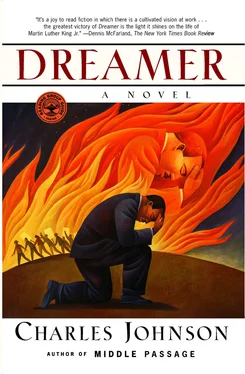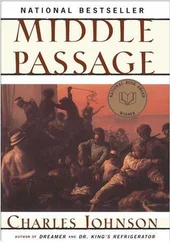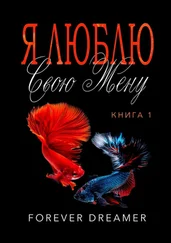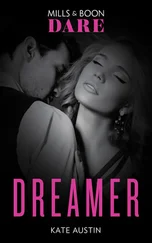Pallbearers brought out King’s bier, loading it onto a flatbed farm wagon pulled by two mules — a striking, martyrial phaeton symbolic of the Poor People’s Campaign that consumed King’s last days. The funeral bells tanged and the wagon began its long trek halfway across Atlanta to Morehouse College, where Rev. Benjamin Mays would give the eulogy. A slow march. A sorrowful march with the mules chacking beneath a sun that burned mercilessly overhead. We fell in behind fifty thousand mourners following the procession. I heard the clop-clop of the mules’ heels on hot concrete. Along the way, spectators crowded the sidewalks, a herd of multicolored humanity guilty of sloth, pride, anger, gluttony, covetousness, envy, lust, and acedia. Some dropped to their knees to pray. In spite of myself, my face broke. Amy took my hand, intertwining her fingers with mine, and I took her grandmama’s. Dressed in black, Mama Pearl had to be hot, there on a spring day in Atlanta, with the crush of bodies that closed us in. Her skin was sweat-streaked. She was weeping as we walked, her mouth quivering. I gave her my handkerchief.
“He was a beautiful man. I know he’s got his jeweled ring and purple robe. And he liked my rugala.” She dabbed at her eyes and handed back my handkerchief, rumpled and moist, and thanked me for it.
“Sama-sama.”
“How’s that again, Matthew?”
“Nothing. I was just thinking—”
“About who killed Dr. King?” asked Amy.
“No,” I said. “I know that.”
“Who?”
“We all did.”
Amy shot me a look, all irritation, as the throng labored with a cautious tread, one that said she couldn’t see herself as responsible. But I saw. I understood. We’d killed him — all of us, black and white — because we didn’t listen when he was alive, though this was, of course, the way of things: no prophet was accepted in his own country. Even before his death, we were looking for other, more “radical” black spokesmen. The Way of agapic love, with its bottomless demands, had proven too hard for this nation. Hatred and competition were easier. Exalting the ethnic ego proved far less challenging than King’s belief in the beloved community. We loved violence — verbal and physical — too dearly. Our collective spirit, the Geist of our era, had slain him as surely as the assassin’s bullet that cut him down. We were all Cainites. And deservedly cursed. Did we not kill the best in ourselves when we killed King? Wasn’t every murder a suicide as well?
All around us, the crowd of the apostates kept pace behind the wagon, concrescing. Walking on, the air now a bright shimmer, I believed in each of us there was a wound, an emptiness that would not be filled in our lifetime. But we could not stop if we wanted to, or go backward.
Amy pressed a little nearer to me, squeezing my hand. “What do you think he’d want us to do now?”
“Excuse me, keep moving forward. If we stop, we’ll fall and be trampled.”
“Matthew?”
“Eh?”
Her eyes swung up, searching my face. “What about Chaym? Where do you think he is?”
I dropped my gaze, watching my feet and those of the sinners in front of me. I thought hard. “Everywhere …”
That seemed to satisfy her, and she smiled as the crowd of the contrite rolled on like a piece of the sea, both of us but waves blending perfectly with its flow, our fingers interlaced, and perhaps she felt, as I did, that if the prophet King had shown us the depths of living possible for those who loved unconditionally in a less than just universe engraved with inequality, and that only the servants should lead, then Chaym had in his covert passage through our lives let us know that, if one missed the Galilean mark, even the pariahs, the fatherless exiles, might sometimes — and occasionally — doeth well.
Amen.
A SCRIBNER PAPERBACK FICTION READING GROUP GUIDE
DISCUSSION POINTS
Who is the real “dreamer” in this novel? Is it Dr. King, dreaming of a world filled with equality and racial harmony? Is it Matthew Bishop, dreaming of the day he will truly become his own man, an individual who shines in his own glory rather than hides in the shadow of others? Or is it Chaym Smith, dreaming of the day he will achieve greatness like Dr. King, yet remain true to his own beliefs?
A major turning point for Matthew is the moment he gives in to his anger at the diner, lashing out at the waitress for her racist behavior. He is exhilarated by his response, even though it goes against everything Dr. King stands for. Discuss other events in Matthews life that reflect Chaym’s influence. Is it wrong for Matthew to behave in this manner, or is it a necessary step he must take to come to terms with his own anger and disillusionment?
Discuss ways in which Chaym and Matthew mirror each other. Both are smart and insightful, but while one always tries to take “the high road,” the other is empowered by his refusal to accept the terms of others. Who ultimately emerges as the winner?
Many literary texts use the “doppelgänger” as a means to explore issues of good versus evil and nature versus nurture. How effectively does Johnson use this device to examine these and other issues? Compare his treatment to other books, such as Mary Shelley’s Frankenstein ?.
Do you agree with Chaym’s assertion that “all narratives are lies”? What does he mean when he says this? That we (individually or as a group) revise history to fit our needs, conveniently “forgetting” events that do not suit our agenda? Does the ability to revise the past make it easier to live with?
When Chaym is slated to make his first public appearance as Dr. King, Matthew closely watches the pulpit, unsure if the man at the podium is Chaym or Dr. King. Who did you think was making the speech as you read the novel? Is Chaym capable of giving such a speech? Discuss ways in which Chayms fate might have changed had he, as planned, stood in for Dr. King that fateful day?
As Chaym dejectedly watches Dr. King accept congratulations for his rousing speech at the A.M.E. church, Matthew describes him as “undergoing a living death in the great mans presence.” Doesn’t this statement actually describe what Matthew himself goes through every day?
Chaym’s emotional growth is charted by his drawings. His earlier artwork, completed before he joined the Movement, seems to focus on his own personal misery. Later, he looks outward and depicts the beauty he finds in his surroundings. What other events signal Chaym’s growth?
Part of Matthew’s job is to keep a detailed record of the Movement. Is Matthew an accurate keeper of the flame? Does his role as history’s scribe make him more powerful than Smith, maybe even more powerful than Dr. King?
Matthew describes himself as “the insecure, callow prop in the background of someone else’s story.” Do you agree with his assessment? Is Matthew an observer or a participant in the making of history? Is he underestimating his importance to the Civil Rights Movement because he believes that his contributions are dwarfed by those of “great men” like Dr. King?
In the end, does Dr. King experience a change of heart when he questions the validity of his peaceful methods? Is this Chaym’s influence shining through? Is King giving up or giving in to pressure?
What do you think about Chaym’s ultimate decision to leave? Is he saving himself, or is he making a sacrifice for the good of Dr. King and the Movement? Was his leaving really the only possible outcome to his situation? What do you think ultimately became of Chaym?
What resemblances are there in the story of King and Chaym to the biblical tale of Cain and Abel? Consider the following:
Читать дальше












